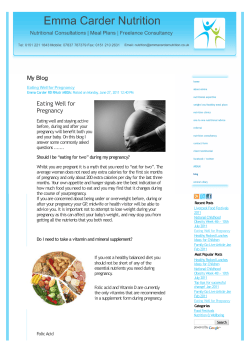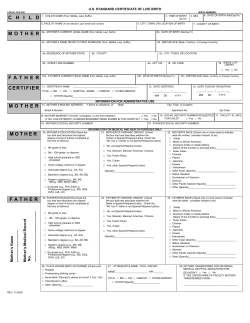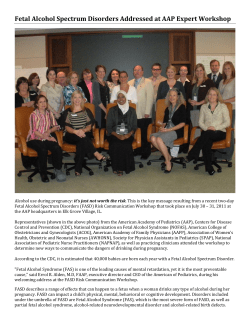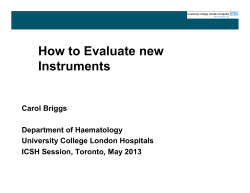
Leukocytosis in Pregnancy as a Result of Ectopic Deciduosis
Leukocytosis in Pregnancy as a Result of Ectopic Deciduosis Karin Sterl, MD1, Shadi Latta, MD2; David Hakimian,MD2 ¹Department of Medicine, West Suburban Medical Center ²Deparment of Hematology-Oncology, Advocate Lutheran General Hospital Introduction: Discussion: Pregnancy is a common cause of mild leukocytosis but a marked elevation in a patient’s white blood cell (WBC) count can be clinically challenging. It can be suggestive of infections, inflammatory diseases, bone marrow disorders or malignancies. This is a case of remarkable leukocytosis in an asymptomatic pregnant female caused by peritoneal ectopic decidual tissue. Post-partum course: Clinical Case: Day 10- WBC: 11400/microL A 35 year old primipara female was diagnosed with mild leukocytosis in the first trimester of pregnancy. Since that time her leukocyte count continued to rise. Pregnancy course: week 32- diagnosed with cholestasis of pregnancy and started ursodiol week 33- WBC: 28000/ microL week 36- developed a tooth infection and completed 7 days of amoxicillin; denied fevers, chills or sweats; WBC: 42000/microL ; platelet count and hematocrit normal; week 37- induction of labor due to cholestasis was unsuccessful and she underwent cesarian section; diffuse intraperitoneal white-tan nodules were noted during the procedure Gynecological oncology consulted; assessed the patient in the operating room and concluded that the etiology of the nodules was uncertain; A frozen pathological section revealed spindle cells. The specimen was sent for pathologic diagnosis. day 1- WBC: 57600 /microL day 2- WBC: 63000/microL Hematology service consulted to evaluate the persistent leukocytosis; FISH study for the BCR-ABL translocation in order to rule out chronic myelogenous leukemia was negative; the possibility of deciduosis was explored at that time and a serum G-CSF level was ordered and was elevated at 243.9 pg/ml Peritoneal biopsy results: Figure 1: Diffuse intraperitoneal white-tan nodules nodular to plaque-like proliferation of epithelioid to spindled cells with abundant eosinophilic to amphophilic cytoplasm and an associated mixed (predominantly neutrophilic) inflammatory cell infiltrate. The lesional cells were immunohistochemically positive for vimentin, progesterone and estrogen receptors and negative for pan keratins AE1+3 and MAK-6, CK5/6, calretinin, HMB-45, EMA and CD117 these results excluded the possibility of deciduoid mesotheliomas or metastatic carcinomas. Mild leukocytosis is a very common finding in pregnancy but the WBC count is usually in the 10,000-15,000/microL range; significantly elevated WBC count warrants further workup. Consideration was given to other causes of leukocytosis in our patient: a leukemoid reaction secondary to cholestasis of pregnancy during her 32nd gestational week or the dental infection that the patient developed during the 36th gestational week; however, the patients markedly elevated leukocyte count could not have been a consequence of these processes; chronic myelogenous leukemia was ruled out by a negative FISH study for the BCR-ABL translocation. Ectopic deciduosis is most commonly seen in the ovaries, cervix and uterine tubes and very rarely in the peritoneum. Most cases of deciduosis are related to normal pregnancy and are asymptomatic but sometimes it can be associated with abdominal pain mimicking appendicitis, hemoperitoneum, hydronephrosis or mechanical ileus. Our case is, to our knowledge, the first one in the literature describing deciduosis producing marked leukocytosis without any accompanying symptoms. the placenta was histologically normal. References: Figure 2: Nodular to plaque-like proliferation of epithelioid to spindled cells with abundant eosinophilic to amphophilic cytoplasm and an associated mixed (predominantly neutrophilic) inflammatory cell infiltrate with karyorrhectic changes. 1. Kondoh et al. Deciduosis can cause remarkable leukocytosis and obscure abdominal pain. J Obstet Gynecol Res. 2012 Dec; 38(2):1376-8. 2. Bolat et al. Pregnancy-related peritoneal ectopic decidua: morphological and clinical evaluation. Turk Patoloji Derg.2012;28(1):50-60. 3. Gradauskas et al. Ectopic decidua presenting with a sigmoid bowel perforation: A case report. J Clin Case Rep 2012, 2:11 4. Lurie et al. Total and differential leukocyte counts percentiles in normal pregnancy. Eur J Obstet Gynecol Reprod Biol.2008 Jan;136(1):16-9 5. Matsubara et al. Concentrations of serum granulocyte colony-stimulating factor in normal pregnancy and preeclampsia. Hypertens Pregnanc. 1999;18(1):95-106
© Copyright 2025



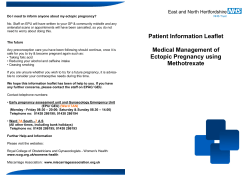

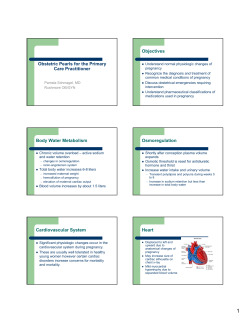

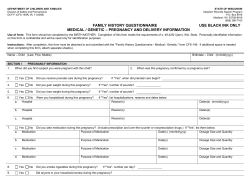
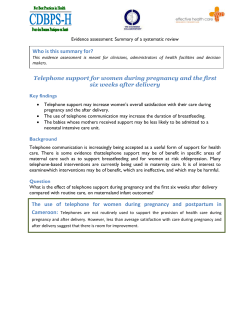
![Case Study 13 – Pregnancy Dengue Clinical Management [26-year-old] Acknowledgements](http://cdn1.abcdocz.com/store/data/000013816_2-9db6ddbb66aba91576c503cec742c32d-250x500.png)

